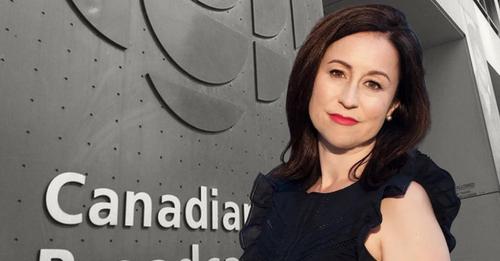Opinion
Resigning staff member writes open letter saying CBC has abandoned “journalistic integrity.”

As 2021 wrapped up, so did the CBC chapter for journalist Tara Henley. After 8 years with the Canadian Broadcasting Corporation Henley left to step out on her own. Here’s her open letter explaining why.
Click here to see this on Substack or read below to see her open letter.
Speaking Freely
Why I resigned from the Canadian Broadcasting Corporation
For months now, I’ve been getting complaints about the Canadian Broadcasting Corporation, where I’ve worked as a TV and radio producer, and occasional on-air columnist, for much of the past decade.
People want to know why, for example, non-binary Filipinos concerned about a lack of LGBT terms in Tagalog is an editorial priority for the CBC, when local issues of broad concern go unreported. Or why our pop culture radio show’s coverage of the Dave Chappelle Netflix special failed to include any of the legions of fans, or comics, that did not find it offensive. Or why, exactly, taxpayers should be funding articles that scold Canadians for using words such as “brainstorm” and “lame.”
Everyone asks the same thing: What is going on at the CBC?
When I started at the national public broadcaster in 2013, the network produced some of the best journalism in the country. By the time I resigned last month, it embodied some of the worst trends in mainstream media. In a short period of time, the CBC went from being a trusted source of news to churning out clickbait that reads like a parody of the student press.
Those of us on the inside know just how swiftly — and how dramatically — the politics of the public broadcaster have shifted.
It used to be that I was the one furthest to the left in any newsroom, occasionally causing strain in story meetings with my views on issues like the housing crisis. I am now easily the most conservative, frequently sparking tension by questioning identity politics. This happened in the span of about 18 months. My own politics did not change.
To work at the CBC in the current climate is to embrace cognitive dissonance and to abandon journalistic integrity.
It is to sign on, enthusiastically, to a radical political agenda that originated on Ivy League campuses in the United States and spread through American social media platforms that monetize outrage and stoke societal divisions. It is to pretend that the “woke” worldview is near universal — even if it is far from popular with those you know, and speak to, and interview, and read.
To work at the CBC now is to accept the idea that race is the most significant thing about a person, and that some races are more relevant to the public conversation than others. It is, in my newsroom, to fill out racial profile forms for every guest you book; to actively book more people of some races and less of others.
To work at the CBC is to submit to job interviews that are not about qualifications or experience — but instead demand the parroting of orthodoxies, the demonstration of fealty to dogma.
It is to become less adversarial to government and corporations and more hostile to ordinary people with ideas that Twitter doesn’t like.
It is to endlessly document microaggressions but pay little attention to evictions; to spotlight company’s political platitudes but have little interest in wages or working conditions. It is to allow sweeping societal changes like lockdowns, vaccine mandates, and school closures to roll out — with little debate. To see billionaires amass extraordinary wealth and bureaucrats amass enormous power — with little scrutiny. And to watch the most vulnerable among us die of drug overdoses — with little comment.
It is to consent to the idea that a growing list of subjects are off the table, that dialogue itself can be harmful. That the big issues of our time are all already settled.
It is to capitulate to certainty, to shut down critical thinking, to stamp out curiosity. To keep one’s mouth shut, to not ask questions, to not rock the boat.
This, while the world burns.
How could good journalism possibly be done under such conditions? How could any of this possibly be healthy for society?
All of this raises larger questions about the direction that North America is headed. Questions about this new moment we are living through — and its impact on the body politic. On class divisions, and economic inequality. On education. On mental health. On literature, and comedy. On science. On liberalism, and democracy.
These questions keep me up at night.
I can no longer push them down. I will no longer hold them back. This Substack is an attempt to find some answers.
I have been a journalist for 20 years, covering everything from hip-hop to news, food to current affairs. The through line has always been books, which I’ve engaged with at every stage of my career and at every outlet I’ve worked for. In 2020, I published my own book, Lean Out: A Meditation on the Madness of Modern Life, which was an instant bestseller in Canada.
Books have always opened new worlds for me, introduced me to new perspectives, and helped me to make sense of humanity. I need books now more than ever.
During lockdown, when I wasn’t covering COVID-19, I spent a lot of time interviewing authors for a new book I’m working on. Their boldness and insight and humour saved me from despair. These writers gave me ideas on how to move forward, and how to maintain hope. Most of all, they gave me the courage to stand up — and to speak out.
Here at Substack, I will continue the work of thinking through the current moment, focusing on non-fiction writing from around the world. I will post an essay on a books related topic every Monday, and a podcast conversation with a heterodox author every Wednesday. This will be free to all. A third post on Fridays will round up the most contrarian, controversial or overlooked new books and essays, and will be available to paid subscribers.
This work is entirely independent and entirely free from editorial control, allowing me to say the things that are not being said, and ask the questions that are not being asked. Lean Out is solely supported by subscribers. If you care about the world of ideas and value open inquiry, as I do, please consider a paid subscription.
And stay tuned for the first episode of the Lean Out podcast this Wednesday, featuring my conversation with Newsweek’s Batya Ungar-Sargon, author of Bad News: How Woke Media is Undermining Democracy.
armed forces
Why we keep getting Remembrance Day wrong

This article supplied by Troy Media.
 By Pat Murphy
By Pat Murphy
Remembrance Day once honoured soldiers for their courage and conviction, but the values they fought for have long since been rejected
With the untimely death of Tim Cook on Oct. 25, Canada lost a valued historian. Military history was Cook’s oeuvre, and the First World War was a particular specialty. His ability to marry academic rigour with accessible storytelling made him a relatively rare bird.
Naturally, Cook wrote about battles, military commanders and political leaders. But he was also fascinated with ordinary soldiers, scouring the archives for personal letters from the front and other material to develop an understanding of what
motivated the soldiers and how they managed the day-to-day horrors of prolonged trench warfare in an environment characterized by cold, mud, lice and rats, not to mention the ever-present spectre of violent death.
Camaraderie was critical. To quote from an interview with Cook: “one of the ways they cope is to create their own tribe, their own group that is insulated from everyone else.”
All of which brings us to Remembrance Day.
Although formally recognized as “remembrance for the men and women who have served, and continue to serve our country during times of war, conflict and peace,” both the origins and iconography of Remembrance Day relate to the First World War. There’s the two-minute silence at the 11th hour of the 11th day of the 11th month to observe the formal end of hostilities in 1918; the playing of the Last Post; and, of course, the ubiquitous red poppies.
The conflict wasn’t post Confederation Canada’s first military endeavour, but its scale dwarfed anything that came before it, and only the subsequent Second World War was a comparable event. Some 620,000 Canadians served between 1914 and 1918 and approximately 60,000 were killed. To get a sense of scale, adjust the fatalities for population growth and it would be comfortably north of 300,000 today.
In War: How Conflict Shaped Us, Margaret MacMillan notes the long history of cultures elevating personal characteristics associated with battlefield success, honouring bravery, endurance, toughness and the willingness to face death. It’s been pretty much a universal characteristic.
Nor should we think of war as only a male activity driven by patriarchal social structures. While it’s true that military hierarchies are traditionally male and the fighting in most wars has been done largely by men, women have always played
a key role in reinforcing the culture.
We, though, have become somewhat uncomfortable with the warrior ethos. Take, for instance, In Flanders Fields. Written in 1915 by Guelph’s John McCrae, the poem has acquired iconic status over the decades. It’s haunting and melancholy, sufficiently so to grab at your throat and send shivers down your spine. It’s also become inextricably intertwined with Remembrance Day.
There is, however, a small problem. While we now view the First World War as senseless carnage, In Flanders Fields has a very different perspective. As the third and final stanza makes unequivocally clear, the poem’s message isn’t about the war’s futility—it’s about the need to keep the faith and carry on to victory.
Much the same can be said about the music associated with the era. Those songs written in recent decades stress the sadness and futility of it all, but the actual popular music of the time was cheerful, patriotic and resolute.
Rather than seeing the soldiers as they were, we insist on recasting them as victims. Stripping them of personal agency, we ignore the fact that 80 per cent of them were volunteers, people who, for various reasons, chose to go to war.
So what motivated them?
Many were surely lured by the male affinity for adventure, compounded by patriotic fervour and enthusiastic loyalty to the concept of king and empire, however incomprehensible or disreputable the latter may now seem to us. There was also the buzz of an environment where the usual social norms regarding life, death and destruction had either vanished or become significantly attenuated. In her book, MacMillan documents how some found the whole experience “vastly exciting.”
Acknowledging this shouldn’t be confused with cheerleading. As I’ve previously written on more than one occasion, I think Britain’s reluctant decision to enter the First World War was a tragic error on many fronts. And if Britain had stood aside, Canada wouldn’t have been involved.
But respectfully remembering those who died shouldn’t be confused with turning them into something they were not. They weren’t hapless victims—they were people with beliefs and values of their own, even if we no longer look at the world in the same way they did.
Troy Media columnist Pat Murphy casts a history buff’s eye at the goings-on in our world. Never cynical – well, perhaps a little bit.
Troy Media empowers Canadian community news outlets by providing independent, insightful analysis and commentary. Our mission is to support local media in helping Canadians stay informed and engaged by delivering reliable content that strengthens community connections and deepens understanding across the country.
armed forces
What A Second World War Aircraft Taught Me About Remembrance Day

From the Frontier Centre for Public Policy
Sitting inside a B-25 showed me why Remembrance Day isn’t something we can take lightly
Here I was, sitting in the rear gun turret of our Mitchell B-25 bomber, with all my senses on guard and my head on a swivel. The day was clear, the sky could not be bluer, and the danger of enemy fighters coming at us with the sun at their back was almost a certainty.
Luckily, we had just finished our bombing run and were on our way back to base. Our experienced pilot, Major David Rohrer, co-pilot Liam Pearson, and flight engineer Jessica Side had managed to get us to the target unscathed, and we now only had to cross the water to make it home.
Suddenly, Dave had to take evasive action, jerking the plane up and to the right in an almost barrel roll. Cool as cucumbers, the rest of the crew stayed silent as they hung on while I continued to marvel at the incredible manoeuvrability of the B-25.
With 18 machine guns and a full bomb load, the B-25 was a true workhorse. Built in 1945 in Missouri, it showed just how multi-purpose the aircraft could be.
All of this was taking place in Canada last July in the country’s only airworthy B-25 Mitchell, flown out of the Canadian Warplane Heritage Museum in Hamilton, Ontario. The pilot was the museum’s CEO and the crew were volunteers. The target was Niagara Falls, then downtown Toronto (where we flew virtually at the same height as the CN Tower) and the body of water was Lake Ontario..
The experience showed the aircraft’s capabilities, but more importantly, it revealed the challenges faced by Canadian and Allied crews in the Second World War. They worked in noisy, cramped spaces that were too hot in summer and too cold in winter; faced constant danger from enemy aircraft and ground-based flak; dodged fighters and often returned with planes full of holes; flew mission after mission with little rest; and lived with the burden of seeing friends shot down or wounded.
This is what our forefathers went through. This is why we still remember and why we need to continue to honour the generations that came before and who fought for Canada and for our values. The Royal Canadian Air Force was born in 1924, 101 years ago. Its members fought gallantly alongside the Royal Air Force (RAF) and United States Army Air Forces, and many Canadians also flew in RAF and other Commonwealth units.
We owe them a debt that cannot be repaid. All we can do is make sure future generations will remember them, honour them, and stand ready to take their place in the next conflict.
Freedom is not free. It is paid for by the blood of men and women warriors prepared to pick up the torch. Warriors who have no cause except that of freedom, equality, and the protection of all.
As U.S. Army general Douglas MacArthur, who led Allied forces in the Pacific during the Second World War, said, “The soldier above all others prays for peace, for it is the soldier who must suffer and bear the deepest wounds and scars of war.”
This Remembrance Day, and at other times, let us remember and thank those who suffered wounds and scars, but let us also rededicate ourselves to follow their brave example.
Michel Maisonneuve is a retired lieutenant-general who served Canada for 45 years. He is a senior fellow at the Frontier Centre for Public Policy and author of In Defence of Canada: Reflections of a Patriot (2024).
-

 armed forces18 hours ago
armed forces18 hours agoIt’s time for Canada to remember, the heroes of Kapyong
-

 Housing2 days ago
Housing2 days agoTrump advancing 50-year mortgage to help more Americans buy homes
-

 International2 days ago
International2 days agoBBC boss quits amid scandal over edited Trump footage
-

 Digital ID19 hours ago
Digital ID19 hours agoCanada moves forward with digital identification for federal benefits seekers
-

 Daily Caller2 days ago
Daily Caller2 days agoMcKinsey outlook for 2025 sharply adjusts prior projections, predicting fossil fuels will dominate well after 2050
-

 Opinion1 day ago
Opinion1 day agoThe Germans called her the ‘White Mouse’ for her elusiveness
-

 Agriculture1 day ago
Agriculture1 day agoBovaer Backlash Update: Danish Farmers Get Green Light to Opt Out as UK Arla Trial Abruptly Ends!
-

 Daily Caller11 hours ago
Daily Caller11 hours agoUS Nuclear Bomber Fleet Shares Fence With Trailer Park Linked To Chinese Intel-Tied Fraudster







